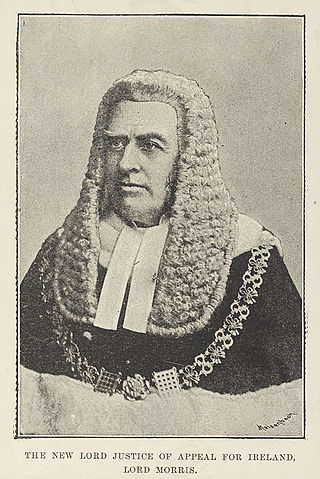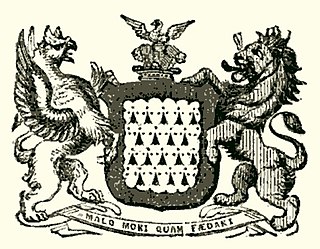Related Research Articles
The Lord High Chancellor of Ireland was the highest judicial office in Ireland until the establishment of the Irish Free State in 1922. From 1721 to the end of 1800, it was also the highest political office of the Irish Parliament: the Chancellor was Speaker of the Irish House of Lords. The Lord Chancellor was also Lord Keeper of the Great Seal of Ireland. In all three respects, the office mirrored the Lord High Chancellor of Great Britain.

The Solicitor-General for Ireland was the holder of an Irish and then United Kingdom government office. The holder was a deputy to the Attorney-General for Ireland, and advised the Crown on Irish legal matters. On rare occasions, there was also a Deputy Attorney-General, who was distinct from the Solicitor-General. At least two holders of the office, Patrick Barnewall (1534–1550) and Sir Roger Wilbraham (1586–1603), played a leading role in Government, although in Barnewall's case, this may be partly because he, was also King's Serjeant. As with the Solicitor General for England and Wales, the Solicitor-General for Ireland was usually a barrister rather than a solicitor.

The Attorney-General for Ireland was an Irish and then, from 1801 under the Acts of Union 1800, United Kingdom government office-holder. He was senior in rank to the Solicitor-General for Ireland: both advised the Crown on Irish legal matters. With the establishment of the Irish Free State in 1922, the duties of the Attorney-General and Solicitor-General for Ireland were taken over by the Attorney General of Ireland. The office of Solicitor-General for Ireland was abolished at the same time for reasons of economy. This led to repeated complaints from the first Attorney General of Ireland, Hugh Kennedy, about the "immense volume of work" which he was now forced to deal with single-handedly.

The Court of Wards and Liveries was a court established during the reign of Henry VIII in England. Its purpose was to administer a system of feudal dues; but as well as the revenue collection, the court was also responsible for wardship and livery issues.

John Barnewall, 3rd Baron Trimleston, was an Irish nobleman, judge and politician. He was the eldest son of Christopher Barnewall, 2nd Baron Trimlestown and his wife Elizabeth Plunket, daughter of Sir Thomas Fitz-Christopher Plunket of Rathmore, Lord Chief Justice of the King's Bench in Ireland and his second wife Marian Cruise. He succeeded his father as 3rd Baron in about 1513. His father, like most of the Anglo-Irish aristocracy, had supported the claim of the pretender Lambert Simnel to the English throne in 1487. After the failure of Simnel's rebellion, he received a royal pardon.
This is a list of lawyers who held the rank of serjeant-at-law at the Bar of Ireland.
Sir William Brabazon, was an English-born soldier and statesman in Ireland. He held office as Vice-Treasurer of Ireland and Lord Justice of Ireland. His descendants still hold the title Earl of Meath.
Sir John Alan was a leading English-born statesman in sixteenth century Ireland. He was a member of the Irish House of Commons, and held the offices of Master of the Rolls in Ireland, Chancellor of the Exchequer of Ireland and Lord Chancellor of Ireland. Though he was childless himself, one of his brothers, William, founded a prominent landowning dynasty in County Kildare. The family's holdings included lands at Celbridge, St. Wolstan's and Kilteel, County Kildare, as well as substantial lands in County Dublin. They also acquired a baronetcy.

John Bathe was an Irish barrister and judge. He was a member of a famous legal dynasty, and had a distinguished career under the Tudors, holding office as Solicitor General for Ireland and Chief Justice of the Irish Common Pleas.
Sir Thomas Luttrell was a wealthy Anglo-Irish landowner of the sixteenth-century Irish Pale. He was also a distinguished lawyer and judge who held the offices of King's Serjeant, Solicitor General for Ireland and Chief Justice of the Irish Common Pleas.
Patrick Barnewall was a leading figure in the Irish Government of the 1530s and 1540s. He owed his position largely to his close links with Thomas Cromwell. He sat in the Irish House of Commons as MP for County Dublin, and held the offices of Solicitor General for Ireland and Master of the Rolls in Ireland. Today he is mainly remembered for his role in founding the King's Inns. He belonged to a junior branch of the family of Lord Trimlestown: his own descendants held the title Viscount Barnewall of Kingsland.
Sir Christopher Barnewall (1522–1575) was a leading Anglo-Irish statesman of the Pale in the 1560s and 1570s. He was the effective Leader of the Opposition in the Irish House of Commons in the Parliament of 1568–71. He is remembered for building Turvey House, where he sheltered the future Catholic martyr Edmund Campion, for his impressive tomb in Lusk Church, and for the eulogy to him in Holinshed's Chronicles, which was written by his son-in-law Richard Stanyhurst.
Robert Cowley, or Colley was an English-born judge in sixteenth-century Ireland who held the office of Master of the Rolls in Ireland. He is chiefly remembered as a possible ancestor of the 1st Duke of Wellington.
Sir Lucas Dillon, also called Luke, was a leading Irish barrister and judge of the Elizabethan era who held the offices of Attorney General for Ireland and Chief Baron of the Irish Exchequer. He supported the Lord Deputy Henry Sidney in the cess controversy and the Lord Deputy John Perrot in the Desmond Rebellions. He was held in high regard by Queen Elizabeth, but was accused by his enemies of corruption and maladministration.
Sir James Dowdall was an Irish judge of the Elizabethan era who briefly held office as Lord Chief Justice of Ireland. He should not be confused with James Dowdall, the Catholic martyr, who was his cousin.
James Bathe (c.1500–1570) was an Irish judge of the Tudor era, who was notable for serving as Chief Baron of the Irish Exchequer for thirty years under four successive monarchs. He was the grandfather of the 1st Earl of Roscommon, and of the noted musicologist William Bathe.
Walter Cowley was an Irish lawyer and politician who was the first holder of the office of Principal Solicitor for Ireland, which was created for him. He was a client of Thomas Cromwell, and later of John Alan, the Lord Chancellor of Ireland, and this connection ultimately led to his downfall. He is best remembered as an ancestor of the 1st Duke of Wellington.
John Bathe (1536-1586) was an Irish lawyer and statesman of the sixteenth century. He held several important offices, including that of Attorney General for Ireland and Chancellor of the Exchequer of Ireland. He was a member of a prominent landowning family from County Dublin, and himself added to the family estates. His children included the Jesuit William Bathe, who was a noted musicologist.
Richard Finglas was an Irish barrister and Law Officer of the sixteenth century.
Sir Robert Dillon of Newtown near Trim was an Irish judge of the Tudor era. He served as Chief Justice of the Irish Common Pleas for more than twenty years, despite repeated calls for his removal on the grounds of age and ill health.